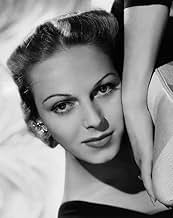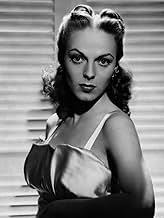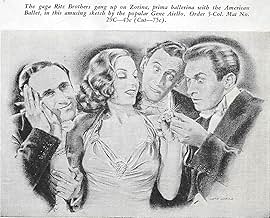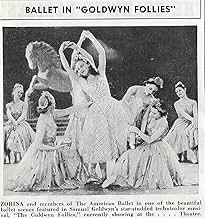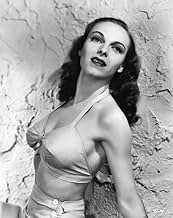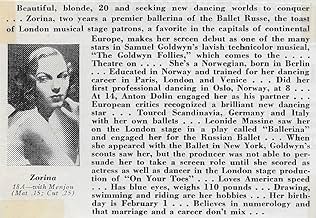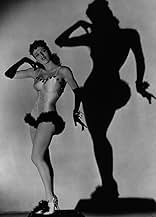Vera Zorina(1917-2003)
- Actress
- Soundtrack
Practically born with ballet slippers on, the dark, lithe and exotic
Vera Zorina had memorable careers with the Ballet Russe and, to a
lesser degree, Hollywood. Born in Berlin, her father Fritz was German
and mother Billie Hartwig Norwegian. She took to ballet at age 2 (she
used to take her ballet slippers to bed with her) and by age 4 was performing. She
received her education at the Lyceum for Girls in Berlin but was
trained in dance by Olga Preobrajenska and Nicholas Legat, the latter
teaching Anna Pavlova and Nijinsky at one time.
The dancing prodigy was presented to Max Reinhardt at age 12 and he in turn cast her in his "A Midsummer Night's Dream" (1929) and "Tales of Hoffman" (1931). A performance at London's Gaiety Theatre led to her entrance into the company of the Ballet Russe de Monte Carlo in 1933. She was encouraged to change her stage name to something Russian and exotic in style and she chose "Vera Zorina" for its authenticity and simplicity from a long list of names. She also learned Russian in the process to feel closer to her dancing compatriots. She stayed with the renowned ballet company for three years appearing everywhere from Covent Garden in London to the Metropolitan Opersa House in New York.
Again, timing proved to be on Vera's side when she won a lead role in the London company of "On Your Toes" in 1937 and was spotted by movie mogul Samuel Goldwyn, who signed her to a movie contract. The build-up was considerable and she made her official debut with the musical The Goldwyn Follies (1938). That same year she increased her visibility ten-fold by marrying noted choreographer/director George Balanchine. She followed her film debut successfully recreating her role in the movie version of On Your Toes (1939) and then played the role of a faux countess in the comedy crime caper I Was an Adventuress (1940). She impressed on Broadway with "I Married an Angel" and even more so in the 1940 musical "Louisiana Purchase" before returning to Hollywood once again to perform in the movie version of Louisiana Purchase (1941) opposite Bob Hope. She was cast as Maria in what could have been the beginning of a dramatic career in the Oscar-winning For Whom the Bell Tolls (1943), but was abruptly replaced after only two weeks of shooting by Ingrid Bergman, an action that proved detrimental to her movie career. When the sudden surge of film offers began to wane after the releases of Follow the Boys (1944) with George Raft and Lover Come Back (1946) co-starring Lucille Ball and George Brent, she bade Hollywood a prompt goodbye.
Following her divorce from Ballanchine in 1946, she married Goddard Lieberson, president of Columbia Records and a social whirlwind ensued. The prominent couple went on to have two sons, Peter and Jonathan. In later years her lilting accent was used for narrations (in several different languages, including English, German and French) on several records and in tandem with numerous classical symphony orchestras and opera houses. She also directed a production of "Herod" for Norwegian TV. Vera was active with the Lincoln Center as an adviser and director and for several seasons directed operas at the Santa Fe Opera Company in New Mexico. She died in Santa Fe of a cerebral hemorrhage in 2003, predeceased by her second husband and son Jonathan.
The dancing prodigy was presented to Max Reinhardt at age 12 and he in turn cast her in his "A Midsummer Night's Dream" (1929) and "Tales of Hoffman" (1931). A performance at London's Gaiety Theatre led to her entrance into the company of the Ballet Russe de Monte Carlo in 1933. She was encouraged to change her stage name to something Russian and exotic in style and she chose "Vera Zorina" for its authenticity and simplicity from a long list of names. She also learned Russian in the process to feel closer to her dancing compatriots. She stayed with the renowned ballet company for three years appearing everywhere from Covent Garden in London to the Metropolitan Opersa House in New York.
Again, timing proved to be on Vera's side when she won a lead role in the London company of "On Your Toes" in 1937 and was spotted by movie mogul Samuel Goldwyn, who signed her to a movie contract. The build-up was considerable and she made her official debut with the musical The Goldwyn Follies (1938). That same year she increased her visibility ten-fold by marrying noted choreographer/director George Balanchine. She followed her film debut successfully recreating her role in the movie version of On Your Toes (1939) and then played the role of a faux countess in the comedy crime caper I Was an Adventuress (1940). She impressed on Broadway with "I Married an Angel" and even more so in the 1940 musical "Louisiana Purchase" before returning to Hollywood once again to perform in the movie version of Louisiana Purchase (1941) opposite Bob Hope. She was cast as Maria in what could have been the beginning of a dramatic career in the Oscar-winning For Whom the Bell Tolls (1943), but was abruptly replaced after only two weeks of shooting by Ingrid Bergman, an action that proved detrimental to her movie career. When the sudden surge of film offers began to wane after the releases of Follow the Boys (1944) with George Raft and Lover Come Back (1946) co-starring Lucille Ball and George Brent, she bade Hollywood a prompt goodbye.
Following her divorce from Ballanchine in 1946, she married Goddard Lieberson, president of Columbia Records and a social whirlwind ensued. The prominent couple went on to have two sons, Peter and Jonathan. In later years her lilting accent was used for narrations (in several different languages, including English, German and French) on several records and in tandem with numerous classical symphony orchestras and opera houses. She also directed a production of "Herod" for Norwegian TV. Vera was active with the Lincoln Center as an adviser and director and for several seasons directed operas at the Santa Fe Opera Company in New Mexico. She died in Santa Fe of a cerebral hemorrhage in 2003, predeceased by her second husband and son Jonathan.


